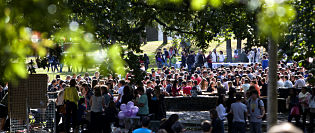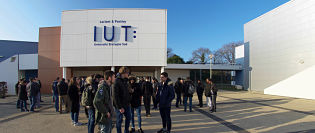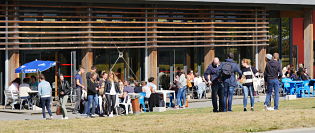Governance & Strategy
GovernanceUniversité Bretagne Sud is a public institution of a scientific, cultural and professional nature.
David Menier, President of Université Bretagne Sud

David Menier began his professional career in 1997 as an Associate Professor of Life and Earth Sciences at UBS Science and Engineering Sciences Training and Research Unit.
After obtaining a D.E.A in Earth Sciences in 1999, he went on to obtain a Doctorate in Marine Geosciences in 2003. From 2004 to 2009, he was Head of UBS Matter and Life Sciences Department. In 2005, he was recruited as a Senior Lecturer and developed research activities around the sedimentary architecture of marine systems. On two occasions, he was the Ocean Geosciences Director of the UBS Pole, UMR CNRS 6538. From 2012 to 2015, on secondment from the Ministry of Higher Education and Research in Malaysia, he was Associate Professor at PETRONAS University of Technology and Deputy Director of the SEACaRL (South East Asia Carbonates Laboratory).
Appointed Professor at UBS in 2021, he is involved in the life of the institution through two Vice-Presidencies: Professional Training and the UBS Foundation, and is continuing his research activities. Common issues to both Brittany and Asia involve sediment routing at the land-sea interface. His term of office runs until 1 July 2028 inclusive.
Michel Gentric, Vice-Chairman of the Board of Directors, in charge of Corporate Social Responsibility and Human Resources
Catherine Kerbrat-Ruellan, Vice-Chairwoman of the Commission for Training and University Life “Training and Success”

xx, Vice-Chairman of the Research Commission
Alexis BAZIRE, Vice President, Healthcare Training

Stéphanie TISSIER, Vice-President, Vocational Training and Student Entrepreneurship

Anne ÉLAIN, Vice-President, Health, Equality, Diversity and Inclusion

Morag Champy McLean, Vice-President International

Christine Chauvin, Vice-President, European University "Emerge"

Gabriel Hardy, Vice President, Campus Life, Sports, Culture and Commitment

Mickaël Castro, Vice-President, Research, in charge of internal relations and partnerships

Chief of Staff of the Presidency
Christophe LE HEN
02 97 87 66 10
christophe.le-hen@univ-ubs.fr
Secretariat : 02 97 87 66 10
president @ univ-ubs.fr
Strategy
The challenges facing UBS
The challenges for UBS are four-fold and relate to the following: the restructuring of the higher education landscape; research and innovation; the need to differentiate and specialise; the response to training requirements; and the human and financial sustainability of our activities.
The July 22, 2013 law on higher education and research required institutions dependent on MENESR (French Ministry of National Education) and research organisations to coordinate amongst themselves, and for the former to merge. Since (if not before) this so-called Fioraso law , the higher education, research and innovation landscape has been constantly restructuring itself in a process that is far from over. UBS, which is surrounded by major University centres such as Rennes, Brest and Nantes, has been part of the Bretagne Pays-de-Loire ComUE since January 1, 2016. This is a group or “community” of seven Universities, 14 colleges and five research organisations. In addition, the PIA (Future Investment Programmes) approach, which is based on excellence and strong governance for promoting institutional mergers, has either strengthened the integration projects or undermined the network organisation of the institutions. It is in this context of enormous disruption – and with little visibility – that UBS operates. Restructuring creates potential opportunities and threats, and it is up to UBS collectively to plot our course so that we can be an active participant in our own future.
Against this unstable background, University sites are beginning to specialise and differentiate themselves with a view to raising their national and international profiles. The aim, at the very least, is to have a commercial image for public viewing and, at best, to present a bona fide identity. In the western region of France, some institutions have made a name for themselves based on their expertise in areas as diverse as the sea, botany, digital technology, industry or even acoustics. Although UBS is – and will continue to be – a multi-disciplinary institution, it cannot remain on the side-lines of these developments, even if only because it needs to maintain its visibility and attract funding and skills by asserting its priorities and allocating its resources.
One of the core challenges for a University like ours, where the training sector plays a dominant role, is to address current and new training needs in professions that are going to evolve significantly or that do not yet exist. This is as true for students as for University staff. It is worth remembering that the public service of higher education contributes, among other things, to "the success of all students" and to "the growth and competitiveness of the economy" (Article L123-2 of the French Education Code). Moreover, its missions include "formal and lifelong training" as well as "guidance, social advancement and integration into the work environment" (Art. L123-3). With unemployment in France touching 10% and being in excess of 20% for the 15-24 age group; with jobs changing over the course of a lifetime; and with training now considered a competitive lever for the economy, our University has a role to play in this area using its strengths and expertise.
A final challenge for UBS (and by no means the least) centres on human and financial resources. As shown by the audit, in the assistance and support mission undertaken by IGAENR (the national body responsible for education, research and sport), UBS’ financial situation will be a cause for concern if things remain as they are, in spite of the significant progress made in increasing our own resources and added value. The total payroll / cashable resources ratio is around 85%, when the alert threshold is set at 83%. This percentage indicates that there is little room for manoeuvre and, more importantly, if it is not controlled or reduced, it will result in the next governance taking drastic measures to cut budgets and jobs. It is our collective responsibility to do everything to ensure that our University functions and develops whithin a constrained budgetary environment.
Every challenge has specific objectives and means. However, there are two objectives that are cross-cutting, namely: the quality and management approach Hcéres noted that there is progress to be made regarding internal self-assessment and external evaluation; and the care and attention given to staff and students, with the quality of life at the University necessarily remaining a priority.
Our four thematic priorities
The work carried out by the clusters, especially via the funding injected into the cross-cutting projects, means we can now highlight four priority research and innovation themes with strong links to training: the sea, materials, cyber security and data sciences. These strategic orientations will be found in the 2017-2021 programme of training courses.
Resources
The choice of these themed priorities, which are closely related to research and innovation, together with our strong desire to enter international markets, means that particular attention will be paid to them in terms of all the resources allotted to the University’s activities. Obtaining (or not) the Sea and Safety EURs (French-style graduate schools) will also have a significant impact in terms of financial resources and allocations.
We have already mentioned that UBS has a policy that focuses heavily on the profiles of research fellows and research posts and an adapted investment policy. The updating of the skills base, while the number of posts should not increase substantially, will necessitate a better match between the priorities, recruitment and job redefinitions. It will also be based on careful management by established and committed professors. Finally, it may (where appropriate) attract researchers and other staff from research organisations, who are still few in number at UBS.
Once the questions of lifelong learning and transferring the outcomes of research to the socio-economic milieu are raised, the relationship between continuing education at the University, private companies and professional sectors will need to be clarified. At the same time, the creation of a subsidiary in partnership with UBO (Université de Bretagne Occidentale) is envisaged.
UBS’s objectives include increasing the number of International theses and European and International collaborative projects, as well as obtaining International Associated Laboratory (LIA) status. These are also a means and are indicators in the service of a bold and ambitious research policy that very clearly aims to make UBS a key player in its flagship areas. This cannot be achieved without strengthening our links with CNRS, other institutions (including Université Bretagne Occidentale in the first instance), UBL (Université Bretagne-Loire), which we are a member of and which has support tools (the 2PE platform), SATT Ouest Valorisation, the UBS Foundation, the regional and local authorities to which we contribute, and the socio-economic community. We will also need to obtain the HRS4R (Human Resources Strategy for Research) label for submitting European projects. The research and partnership department will also strengthen its support activities for research fellows and researchers to help develop research and innovation at the University.
Finally, to maintain the quality of our facilities and with a view to upgrading them, we will implement a master plan for research investment.



